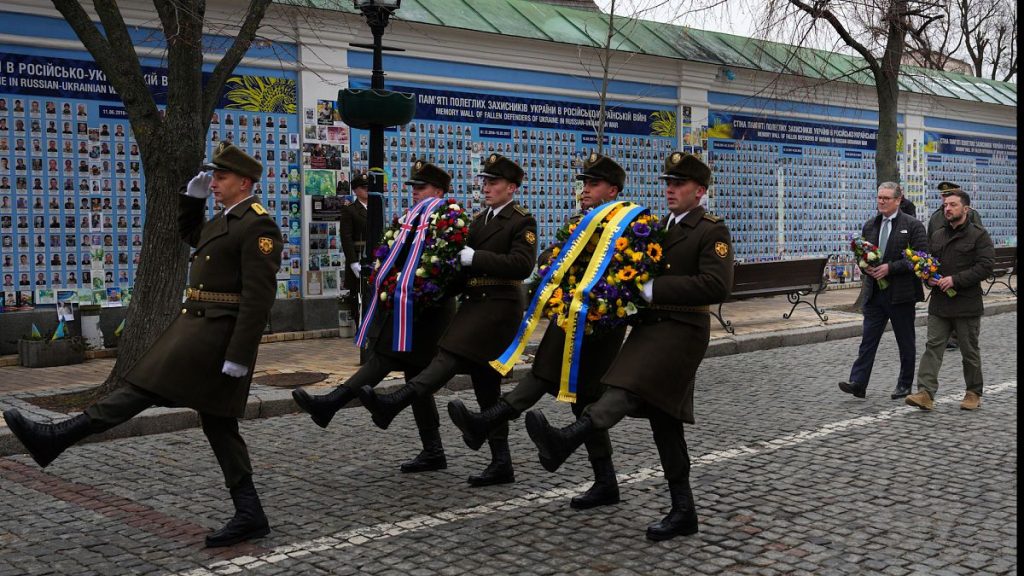The visit of British Labour Party leader Keir Starmer to Kyiv in February 2023 marked a significant moment in the ongoing UK-Ukraine relationship amidst the backdrop of the Russia-Ukraine conflict. Starmer’s presence, his first visit to Ukraine as leader of the opposition, underscored the UK’s steadfast commitment to supporting Ukraine in its fight for sovereignty and territorial integrity against Russian aggression. The poignant act of laying wreaths at the war remembrance wall outside St. Michael’s Golden-Domed Monastery alongside President Zelenskyy symbolized the shared grief and solidarity between the two nations, paying tribute to the Ukrainian lives lost in the conflict. This wall, a somber testament to the human cost of war, has become a focal point for Ukrainians mourning their fallen compatriots, a tangible representation of the enduring impact of the conflict on individuals, families, and the nation as a whole.
Starmer’s visit went beyond symbolic gestures, carrying with it a substantial pledge of long-term security support for Ukraine. This commitment, articulated through the proposed “100-Year Partnership” treaty, signifies a deep and enduring alliance between the UK and Ukraine, extending far beyond immediate military aid. This comprehensive partnership envisions collaboration across key sectors crucial for Ukraine’s future stability and prosperity, namely defence, energy, trade, and science. In the realm of defence, the treaty aims to bolster Ukraine’s military capabilities, enhancing its ability to defend itself against future threats. The energy component seeks to strengthen Ukraine’s energy security, reducing its dependence on external sources and promoting sustainable energy development. Trade cooperation looks to stimulate economic growth and create opportunities for both nations, fostering closer economic ties. Finally, the focus on scientific collaboration aims to promote innovation and technological advancement, contributing to Ukraine’s long-term development and resilience.
The proposed “100-Year Partnership” treaty represents a strategic shift in UK-Ukraine relations, moving beyond immediate crisis response to a long-term vision of shared interests and mutual support. This long-term commitment carries significant implications, both for Ukraine’s future and for the broader geopolitical landscape. For Ukraine, the treaty offers a crucial lifeline, providing a framework for sustained assistance in rebuilding its economy, strengthening its defence capabilities, and securing its place in the international community. It signals a commitment to helping Ukraine not just survive the current conflict, but also thrive in the decades to come. This long-term support is essential for Ukraine’s recovery and its integration with European structures, ultimately contributing to stability and security in the region.
Beyond the bilateral benefits for the UK and Ukraine, the proposed treaty also sends a strong message to Russia and the international community. It underscores the UK’s unwavering commitment to supporting Ukraine’s sovereignty and its resolve to stand against Russian aggression. It signals a long-term commitment to containing Russian influence in the region and upholding the principles of international law. The treaty also serves to strengthen the transatlantic alliance, demonstrating unity and resolve among Western nations in their support for Ukraine. This unified front is crucial in deterring further Russian aggression and promoting a peaceful resolution to the conflict. The treaty’s emphasis on long-term cooperation also aims to discourage any future attempts by Russia or other actors to destabilize the region.
The visit and the proposed treaty have broader implications for the future of UK foreign policy. It signifies a renewed focus on long-term strategic partnerships, particularly in regions of geopolitical importance. The emphasis on defence, energy, trade, and scientific cooperation within the treaty framework demonstrates a comprehensive approach to international relations, recognizing the interconnectedness of security, economic prosperity, and technological advancement. This approach reflects a growing recognition within the UK of the need to engage proactively in shaping the global landscape and promoting its interests in a rapidly changing world. The commitment to a long-term partnership with Ukraine can be seen as a model for future strategic engagements with other nations, particularly those facing similar challenges or located in strategically important regions.
In conclusion, Keir Starmer’s visit to Kyiv and the proposed “100-Year Partnership” treaty represent a pivotal moment in UK-Ukraine relations. The symbolism of the visit, coupled with the concrete commitments outlined in the treaty, underscores the depth and breadth of the UK’s support for Ukraine. This long-term partnership promises to provide a crucial foundation for Ukraine’s future stability and prosperity, strengthening its resilience against future threats and helping it integrate more closely with the international community. Furthermore, the treaty sends a powerful message to Russia and the international community, reaffirming the UK’s commitment to upholding international law and supporting its allies in the face of aggression. It also signals a shift in UK foreign policy, prioritizing long-term strategic partnerships and adopting a comprehensive approach to international engagement. This strengthened relationship between the UK and Ukraine holds the potential to significantly impact the geopolitical landscape in the years to come, promoting stability and security in the region and beyond.














